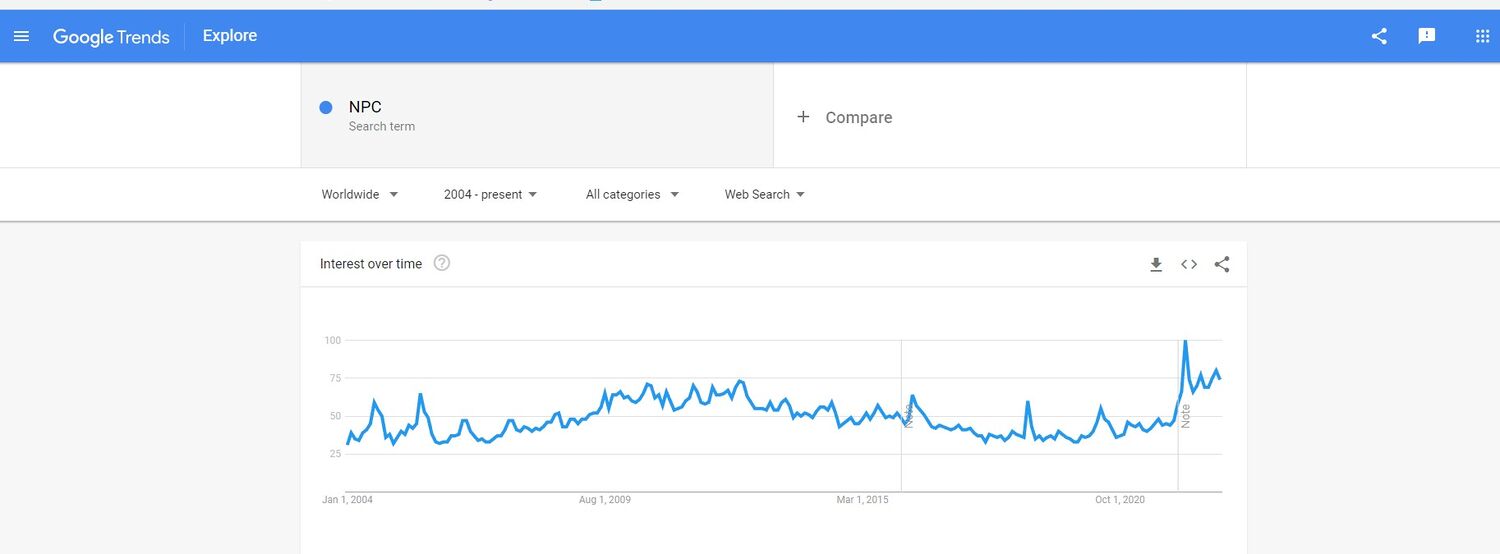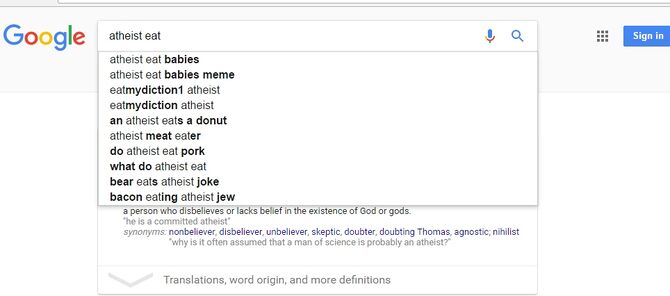A Meme is a term used to describe the spread and modification of ideas in a selection and reproduction context. Richard Dawkins coined the term and the concept of a meme, in his book, "The Selfish Gene", and expanded on his theory in "The God Delusion" [1] Memes are sometimes compared to viruses as an analogy, in that ideas pass to new people from those who already have that idea ("transmission"), and that they will also change over time to become more effective at catching people's attention and remaining in their mind. This is because someone who contacts the idea but doesn't like it is unlikely to spread the idea to others, so the easily transmitted ideas spread further.
That is, there are two main ways ideas can spread - by being transmitted easily, or by remaining in someone's mind for a long time (having a low transmission rate but many opportunities for that transmission to occur). The term has also been applied to the spread of viral fads on the Internet such as certain YouTube videos, because the fads spread rapidly and are only introduced to new people through those who have already contacted it. These are in the category of being transmitted easily, and since they have low staying power, they rarely remain popular for more than a few months each.
Concept of a Meme
According to Dawkins, a meme is any cultural entity that can be considered a replicator, and cites melodies, cultural similarities, and learned skills as examples. In theory, because a human does not copy memes precisely, and because humans have the ability to refine, edit, and otherwise alter memes, they can change over time, akin to the Theory of Evolution. Unlike in biological evolution, Memes do not require a physical medium to be transferred, thus theoretically, allowing for far higher rates of change.
Transmission of a meme
Some popular theories on how memes transmit include:
- Quantity of parenthood: an idea that influences the number of children one has. Children respond particularly receptively to the ideas of their parents, and thus ideas that directly or indirectly encourage a higher birthrate will replicate themselves at a higher rate than those that discourage higher birthrates.
- Efficiency of parenthood: an idea that increases the proportion of children who will adopt ideas of their parents. Cultural separatism exemplifies one practice in which one can expect a higher rate of meme-replication—because the meme for separation creates a barrier from exposure to competing ideas.
- Proselytic: ideas generally passed to others beyond one's own children. Ideas that encourage the proselytism of a meme, as seen in many religious or political movements, can replicate memes horizontally through a given generation, spreading more rapidly than parent-to-child meme-transmissions do.
- Preservational: ideas that influence those that hold them to continue to hold them for a long time. Ideas that encourage longevity in their hosts, or leave their hosts particularly resistant to abandoning or replacing these ideas, enhance the preservability of memes and afford protection from the competition or proselytism of other memes.
- Adversative: ideas that influence those that hold them to attack or sabotage competing ideas and/or those that hold them. Adversative replication can give an advantage in meme transmission when the meme itself encourages aggression against other memes.
- Cognitive: ideas perceived as cogent by most in the population who encounter them. Cognitively transmitted memes depend heavily on a cluster of other ideas and cognitive traits already widely held in the population, and thus usually spread more passively than other forms of meme transmission. Memes spread in cognitive transmission do not count as self-replicating.
- Motivational: ideas that people adopt because they perceive some self-interest in adopting them. Strictly speaking, motivationally transmitted memes do not self-propagate, but this mode of transmission often occurs in association with memes self-replicated in the efficiency parental, proselytic and preservational modes.
Memetics
For a more detailed treatment, see Memetics.
The field of study of Memes is "Memetics". Memeticists have proposed that just as memes function analogously to genes, memetics functions analogously to genetics. Memetics attempts to apply conventional scientific methods (such as those used in population genetics and epidemiology) to explain existing patterns and transmission of cultural ideas. Critics, however, claim that Memetics is still at best, a protoscience, and at worst, a pseudoscience, citing difficulties in tracking changes discreetly, scientifically disproving, and evaluating factors.
Internet Meme
A subdivision of Memes, is the internet meme, referring to the spread of ideas across the Internet-based email, blogs, forums, Imageboards, social networking sites, instant messaging and video streaming sites such as YouTube. This term is criticised by memeticists, who feel that there is no real division between a meme, and an internet meme.
Atheism and Richard Dawkins memes
On a worldwide basis, atheism is not a very robust meme and global atheism is shrinking in terms of its global market share. In the Western World due to immigration, the higher birth rates of religious people and other factors, the secularism and atheism memes are expected to decline.[2][3] Professor Eric Kaufmann writes: "Committed religious populations are growing in the West, and will reverse the march of secularism before 2050."[4]
In addition, post Elevatorgate, the Richard Dawkins meme has markedly diminished in both influence and frequency (see: Richard Dawkins' loss of influence). At the same time, the meme of young earth creationism is growing rapidly in terms of its global presence.[5]
NPC internet meme
The NPC internet meme (derived from non-player character in video gaming), is a politically right-wing internet meme that represents liberals/leftists who do not think for themselves, lack critical thinking skills and have been politically indoctrinated.
According to website The Verge:
| “ | Last week, The New York Times published a piece about an insular 4chan meme that had started to bleed over into political Twitter. At the time, NPC — an acronym for the gaming term “non-playable character” — had been weaponized.. in an attempt to “own the libs” by calling them automatons, but it was still a relatively niche meme very few outlets had touched.
Along with a couple of stories before it, the Times’ article kicked off a domino effect: its publication prompted popular members of the alt-right — including Paul Joseph Watson and Infowars — to amplify the meme to their audiences through YouTube videos, articles, and tweets. Search results for “NPC” increased, according to Google Trends... Suddenly, a meme... [was] telegraphed to a massive audience in a jarringly forced display of virality that highlights just how quickly an inside joke from an insular community can spread with the oxygen of press coverage. [6] |
” |
The rise of the NPC internet meme
There has been a huge rise in the use of the NPC meme on the internet as can be seen by this Google Trends graph of worldwide searches for the term "NPC".
The main factors are:
1. Elon Musk taking over Twitter which gave a boost to the political right.
2. Supporters of right-wing politics are getting more active in culture war issues such as anti-woke backlash.
3. The growing hunger for free speech and anti-cancel culture sentiments.
4. The rise of a few other right-wing friendly social media platforms (Rumble, Gab, etc.).
5. Right-wingers are aggressively building their own ecosystem.
6. A right-wing populist programme normally encompasses factors such as economic protectionism/problems and anti-imigration/anti-illegal immigration sentiments and these factors are rising in some countries.
7. European right-wing political figures (Marine Le Pen, Viktor Orbán, Andrej Duda, etc.) are using the European Union corruption scandal as a political weapon and inciting anti-EU sentiment ahead of the 2024 European Parliament elections which is giving a bounce to right-wingers.
(The popularity of video gaming is somewhat down from its coronavirus pandemic high so that cannot explain why the NPC meme is currently rising in popularity in the above Google trends graph.)
Atheists eat babies meme
See also: Atheists eat babies meme

The atheists eat babies meme is a dark humor meme used to illustrate the fact that many people distrust atheists and equate atheism with immorality (see: Distrust of atheists and Atheism and morality).[8] There have been several studies indicating that many people have a low opinion of atheists (see: Views on atheists).
However, as can be seen below, China which has the largest atheist population in the world and has state atheism, has citizens who are eating powdered human baby flesh because they believe it increases a person's stamina, increases sexual health and is also seen as a medicinal 'cure-all'.[9][10] (see:Communist China and baby eating).
See also: Atheism and cannibalism
Notes
- ↑ Dawkins, Richard (1989), The Selfish Gene (2 ed.), Oxford University Press, p. 192, ISBN 0-19-286092-5,
- ↑ Early paper - Shall the Religious Inherit the Earth?: Demography and Politics in the Twenty-First Century by Eric Kaufmann, Belfer Center, Harvard University/Birkbeck College, University of London
- ↑ Why are 2012 and 2020 key years for Christian creationists and pro-lifers?
- ↑ Early paper - Shall the Religious Inherit the Earth?: Demography and Politics in the Twenty-First Century by Eric Kaufmann, Belfer Center, Harvard University/Birkbeck College, University of London
- ↑ Global decline of atheism and the rise of global creationism. Information on the Question Evolution! Campaign
- ↑ The NPC meme went viral when the media gave it oxygen, The Verge, 2018
- ↑ Chinese cannibalism of infant flesh outrages the world, Washington Times, 2014
- ↑ Know your meme - Atheist eats baby, Knowyourmeme.com
- ↑ Chinese cannibalism of infant flesh outrages the world, Washington Times, 2014
- ↑ Thousands of pills filled with powdered human baby flesh discovered by customs officials in South Korea, The Daily Mail, 2012



